Page Table of Contents
About the Author
Hot Topics
Updated on Jan 29, 2026
Have you decided to format your M.2 SSD to improve its performance or because you're planning to change the file system to a more recent one, like exFAT, for your Windows 10 PC? Whatever the reason, there are several methods you can try. Continue reading this article, as EaseUS will show you how to format your M.2 SSD in Windows 10 and the different methods you can use to do that.
How to Format an M.2 SSD in Windows 10 - 3 Ways
There are three different ways to format an M.2 SSD in Windows 10. They are all easy and quick to perform. Here's a comprehensive look at them to decide which works for you and use that solution to quickly format your M.2 SSD.
| ⏱️Duration | About 5 Minutes |
| 💻Goal | Format an M.2 SSD in Windows 10 |
| 🧰Preparation | Computer, an M.2 SSD, EaseUS Partition Master |
| 🛠️Methods |
✔️[Easy] EaseUS Partition Master ✔️[Medium] Disk Management ✔️[Complex] CMD/BIOS |
Way 1. Format M.2 SSD in Windows 10 with EaseUS Partition Master
If you're formatting your drive to change the file system, try to use EaseUS Partition Master. It is an all-featured partition management software that allows you to format M.2 SSD from NTFS to FAT32 or exFAT successfully and efficiently. With the help of its powerful "Partition Manager" feature, you can format your M.2 SSD within 4 steps. Try it out today to format your SSD in no time!
Quick steps to format M.2 SSD in Windows 10 with EaseUS Partition Master:
Step 1. Launch EaseUS Partition Master, right-click the partition on your external hard drive/USB/SD card which you want to format and choose the "Format" option.
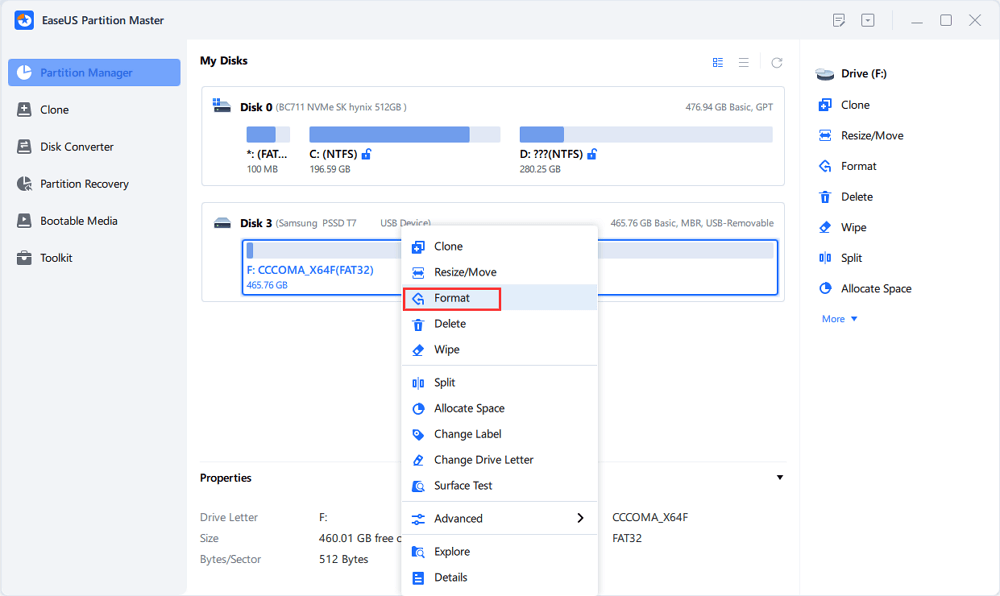
Step 2. Assign a new partition label, file system (NTFS/FAT32/EXT2/EXT3/EXT4/exFAT), and cluster size to the selected partition, then click "OK".
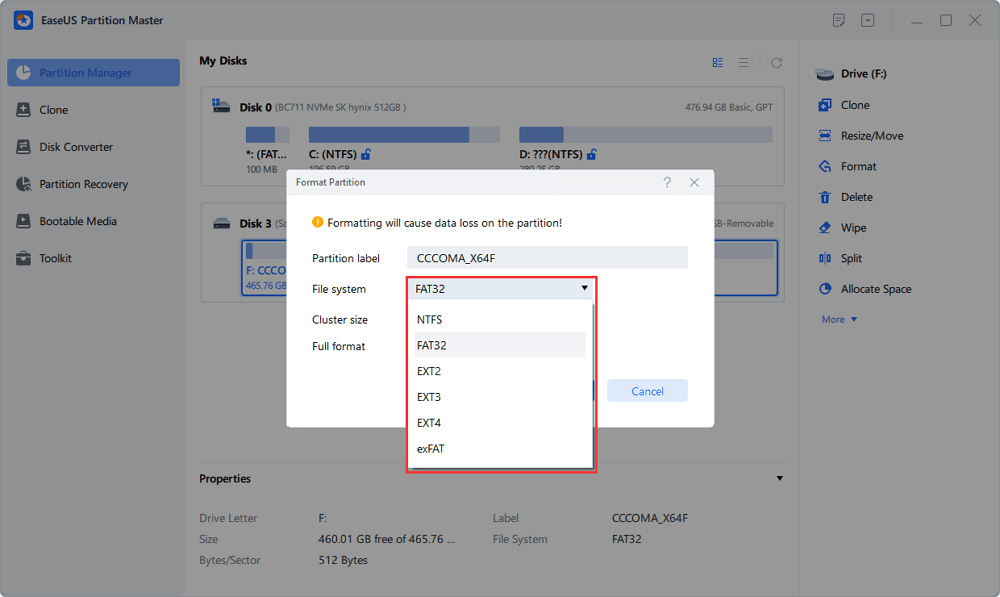
Step 3. In the Warning window, click "Yes" to continue.
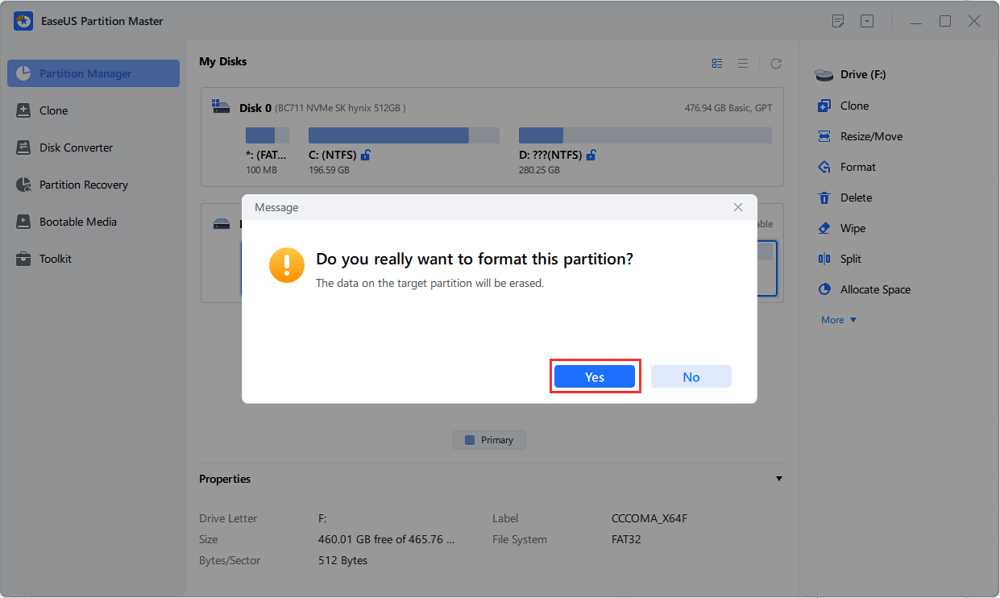
Step 4. Click the "Execute 1 Task(s)" button in the top-left corner to review the changes, then click "Apply" to start formatting your external hard drive/USB/SD card.
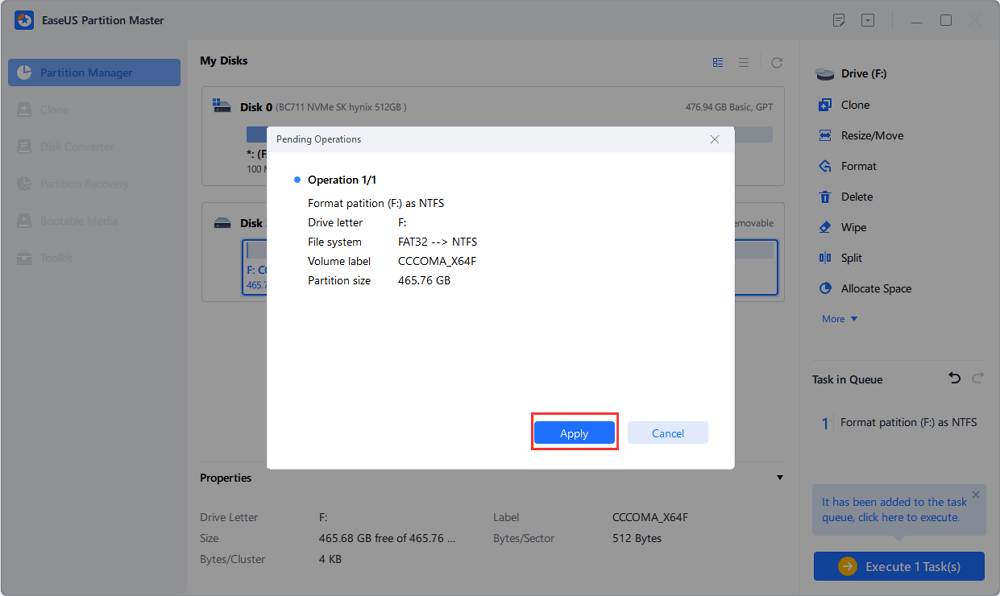
EaseUS Partition Master is a versatile tool for disk management beyond SSD formatting. This software allows you to do the following operations:
- Fix M.2 SSD not showing up in Windows 11 problem.
- Test M.2 SSD speed on Windows
- Install Windows 10 on M.2 SSD
- M.2 Temperature Monitor: this software can check your M.2 SSD's temperature.
- Easily check M.2 SSD performance.
Way 2. Using Disk Management to Format an M.2 SSD in Windows 10
You can view, create, and manage the disk drives installed on your computer using the Disk Management utility for Windows. Here's how to use it to format your M.2 SSD:
Step 1. Right-click on the "Start" option and select "Disk Management."
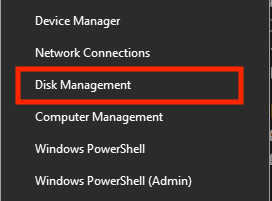
Step 2. Select the SSD you want to format. Right-click on it and select "Format."
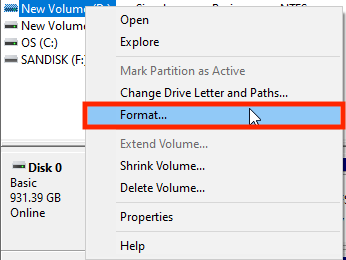
Step 3. Select the file system to which you want to format your M.2 SSD by clicking on the "File system" drop-down.
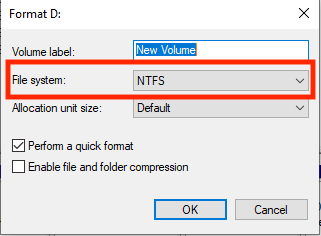
Step 4. Click on "OK."
Step 5. A pop-up box will open. Click on "OK."
If the Disk Management's format option is greyed out, you can refer to the reliable methods below to fix this issue:
How to Fix Disk Management Format Option Greyed Out in Windows 11/10/8/7
This article will teach you three useful ways to repair the format option that is greyed out in disk management on your Windows PC.
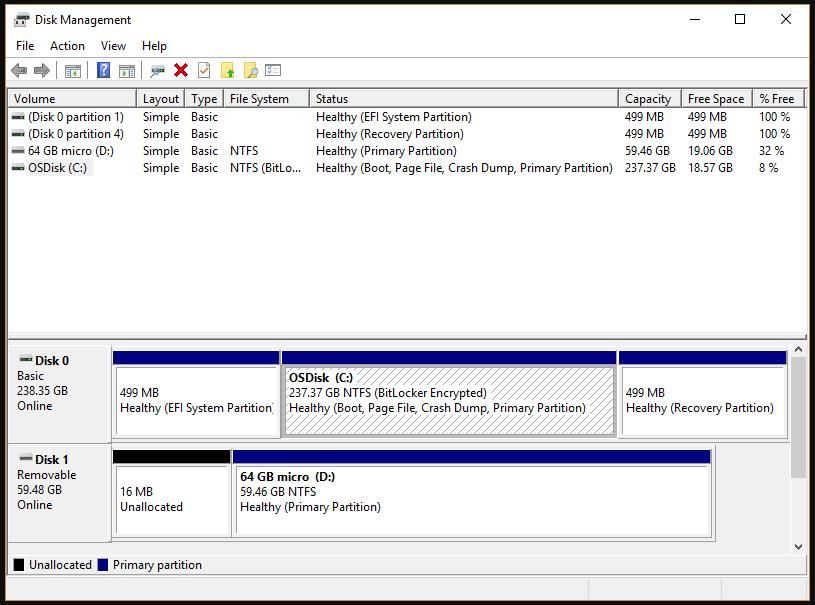
Way 3. Run CMD/BIOS to Format M.2 SSD in Windows 10
You can also use the command prompt to format your M.2 SSD. This step is beneficial if your SSD crashes and isn't booting Windows or functioning correctly. You can open the command prompt from the BIOS window and format your M.2 SSD to make it work again.
Here's how to do that:
Step 1. In the BIOS, boot your computer from the Windows 10 installation media. Click "Next" in the setup window.
Step 2. Choose the "Repair your computer" and "Troubleshoot" options.
Step 3. And then, in the next window, select "Command Prompt," where you can type the following CMD:
- diskpart
- list volume
- select volume P (replace P with the number of your SSD drive you want to format.)
- format fs=ntfs quick label=test (You can replace "ntfs" with any file system you intend to format.)
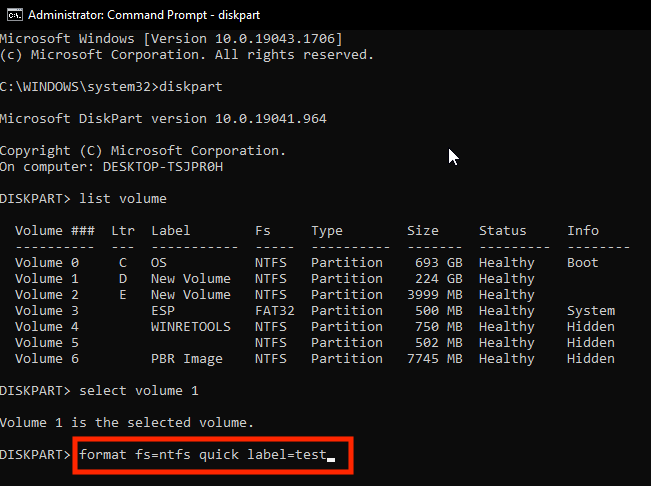
Step 4. Lastly, type and enter exit to quit this program.
For more solution to format hard drive from BISO, click the link below:
How to Format Hard Drive from BIOS Windows 10
This guide will provide three complete guides to formatting the hard drives from BIOS Windows 10, including format via EaseUS Partition Master, Command Prompt, and formatting the drive during Windows installation.
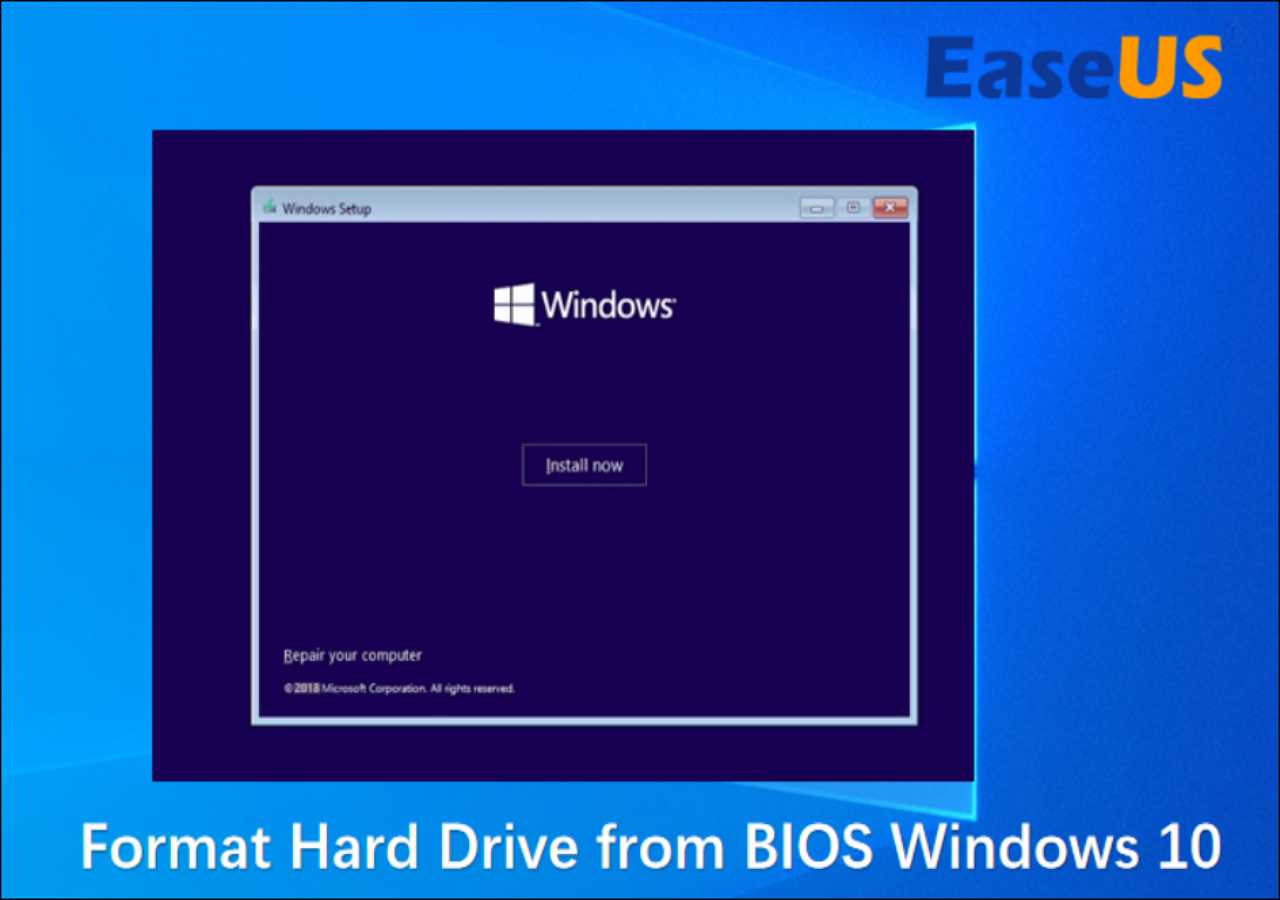
This passage includes three effective ways how to format an M.2 SSD, which you can share on your social media to help more users in such trouble:
When Should I Format M.2 SSD in Windows 10
There are multiple reasons why you should consider formatting your M.2 SSD. Some of the reasons why you should care:
- Fixing performance or any other issues: An SSD gets slower over time because of many temporary files or disk fragmentation. Formatting the drive clears everything and improves the drive's performance.
- Changing the file system: Another reason you should consider formatting your M.2 SSD is if you want to change the file system. Different file systems have their pros and cons. If you want to change the existing file system of your drive to a different one, you should consider formatting your M.2 SSD.
- Reusing a used M.2 SSD: If you bought a used M.2 SSD, you should consider formatting it. Otherwise, if it has any viruses or malware, it will infect your computer and make it unusable. Formatting the SSD removes everything and makes it safe to use.
Conclusion
If you're facing a problem with your M.2 SSD, if it has gotten slow over time, or if you're buying or selling your SSD, no matter the reason, you need to format it. If you want to format your SSD just because you want to change the file system, with EaseUS Partition Master, you can change the file system without formatting, saving you precious files and lots of time. It's also your all-in-one solution for your SSD. Otherwise, you can also format your SSD using Disk Management or the command prompt, but they aren't as advanced and easy to use.
FAQs About How to Format an M.2 SSD in Windows 10
Do you have any other questions about how to format an M.2 SSD on Windows 10? Here, we answer a few questions about it.
1. Should I format M.2 SSD before installing Windows 10?
It's best to format your M.2 SSD before installing Windows. Not only will its performance improve, but you can also select the file system beforehand. Otherwise, you must reformat your SSD and install Windows again if you want to change the file system. And then, you can install Windows 10 on SSD.
2. How can I format M.2 drive to NTFS?
You can use EaseUS Partition Master to format your M.2 drive to NTFS, or you can also use Disk Management or the command prompt to do that as well. We've shown you how to format your SSD in our above solutions, but remember to select NTFS instead of a different file system.
3. How to format a new SSD from the BIOS Windows 10?
Here's how to format a new SSD from the BIOS:
Step 1. Start your computer using the Windows 10 installation media in the BIOS. In the setup window, select "Next."
Step 2. Locate "Repair your computer" to Choose "Troubleshoot."
Step 3. In the following menu, select "Command Prompt." Type and enter the following commands one by one:
- list disk
- select disk X (replace X with the disk number you want to format.)
- clean
- create partition primary
- format fs=ntfs quick
- assign
That's it! Your SSD is now formatted to the NTFS file system.
How Can We Help You
About the Author
Updated by Tracy King
Tracy became a member of the EaseUS content team in 2013. Being a technical writer for over 10 years, she is enthusiastic about sharing tips to assist readers in resolving complex issues in disk management, file transfer, PC & Mac performance optimization, etc., like an expert.
Cici is the junior editor of the writing team of EaseUS. She accepted the systematic training on computers at EaseUS for over one year. Now, she wrote a lot of professional articles to help people resolve the issues of hard drive corruption, computer boot errors, and disk partition problems.
Product Reviews
-
I love that the changes you make with EaseUS Partition Master Free aren't immediately applied to the disks. It makes it way easier to play out what will happen after you've made all the changes. I also think the overall look and feel of EaseUS Partition Master Free makes whatever you're doing with your computer's partitions easy.
Read More -
Partition Master Free can Resize, Move, Merge, Migrate, and Copy disks or partitions; convert to local, change label, defragment, check and explore partition; and much more. A premium upgrade adds free tech support and the ability to resize dynamic volumes.
Read More -
It won't hot image your drives or align them, but since it's coupled with a partition manager, it allows you do perform many tasks at once, instead of just cloning drives. You can move partitions around, resize them, defragment, and more, along with the other tools you'd expect from a cloning tool.
Read More
Related Articles
-
How to Remove Partition on External Hard Drive [2026 Updated]
![author icon]() Jean/2026/01/29
Jean/2026/01/29 -
How to Add Memory to PS5 | 4 Ways🔥
![author icon]() Shelly/2026/01/29
Shelly/2026/01/29 -
Difference Between SFC, CHKDSK, and DISM Windows 11
![author icon]() Tracy King/2026/01/29
Tracy King/2026/01/29 -
How to Find What Is Taking Up Space on My SSD [Effective Ways]
![author icon]() Cici/2026/01/29
Cici/2026/01/29
Hot Topics
EaseUS Partition Master

Version 20.0 is here - full exFAT support, easier disk partitioning, and PC performance optimization.








